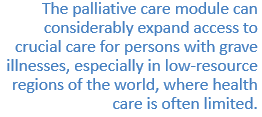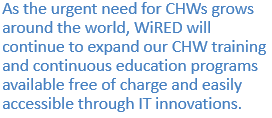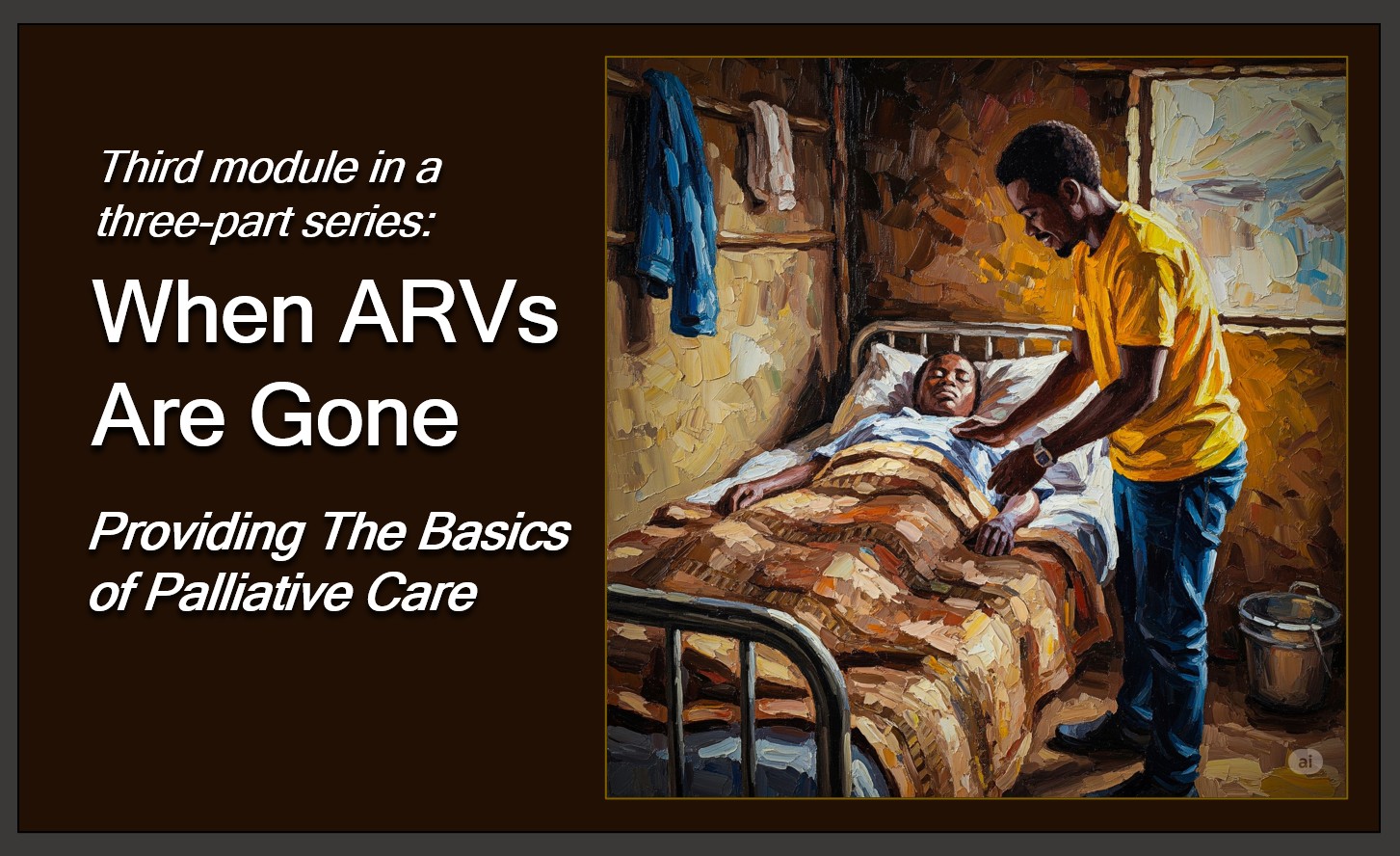By Allison Kozicharow; Edited by Elizabeth Fine
When ARVs, Vaccines and Medications Are Gone
Today, antiretrovirals (ARVs), vaccines and medications are in short supply or unavailable. How are community health workers (CHWs) operating in underserved countries to help people living with HIV and other diseases?
In response to the Trump Administration’s sweeping suspension of U.S. global health assistance, WiRED International has developed an urgent three-part course for CHWs, the last of which is now available: When ARVs Are Gone: Providing Basic Palliative Care.
 The course, called “When ARVs Are Gone,” includes:
The course, called “When ARVs Are Gone,” includes:
- HIV/AIDS Symptoms Management (released on March 8 — see story here)
- Providing Mental Health Support for People Living with HIV (released April 28 — see story here).
- Providing Basic Palliative Care
Each module, written by medical professionals, packages evidence-based and peer-reviewed information not readily available elsewhere for CHWs working in remote regions. All CHWs — trained by WiRED or by other organizations — are invited to access the free modules online or by way of a phone app (see Distribution sidebar for directions).
WiRED’s Basic Palliative Care Module
The palliative care module can considerably expand access to crucial care for persons with grave illnesses, especially in low-resource regions of the world, where health care is often limited.
The material in this module offers CHWs guidance on key aspects of palliative care and how to address late stages of diseases and end-of-life interventions. Specifically, it assists CHWs who lack access to essential medicines. This is particularly important now, given the abrupt U.S. funding cuts that have significantly disrupted the availability of medicines. (Note that the cuts have also severely curtailed the availability of vaccines that will in short order contribute to the rapid rise of infectious diseases in affected regions.)
At the completion of this module, CHWs will be able to:
- Define palliative care
- Understand barriers to palliative care
- Identify what types of patients benefit from palliative care
- List the goals of palliative care:
- Symptoms management
- Improved quality of life
- Support for families
 Communication and shared decision-making
Communication and shared decision-making
- List the principles of palliative care:
- Holistic approach
- Patient- and family-centered care
- Interdisciplinary teamwork
- Early Intervention
- Focus on quality of life
- Ethical considerations
- List the roles of the CHW in palliative care
- Explain the benefits of palliative care
- Discuss the range of services and resources involved in palliative care
- Understand non-drug treatments for pain
Going Forward
According to impactcounter.com’s Impact Metrics Dashboard, the Trump administration’s elimination of global aid has already cost the lives of 98,047 adults and 204,590 children — that amounts to 103 deaths per hour from preventable diseases. For HIV alone, the funding cancellation has caused 55,058 adult deaths and 5,861 infant deaths to date. And the projected figures posted by impactcounter.com are simply frightening. (See footnote)
Although nothing other than medicines, and in some cases vaccines, can keep HIV/AIDS cases and other diseases such as cholera and tuberculosis from escalating, CHWs can use the new WiRED training tools to address the health crises faced without medication access.
 As the urgent need for CHWs grows around the world, WiRED will continue to expand our CHW training and continuous education programs available free of charge and easily accessible through IT innovations. WiRED will persist in seeking partnerships with universities, hospitals, schools and NGOs — as recently evidenced by our joint course collaboration at Tom Mboya University in Kenya to provide critical health training, using a professional level curriculum adapted for regional needs and resources.
As the urgent need for CHWs grows around the world, WiRED will continue to expand our CHW training and continuous education programs available free of charge and easily accessible through IT innovations. WiRED will persist in seeking partnerships with universities, hospitals, schools and NGOs — as recently evidenced by our joint course collaboration at Tom Mboya University in Kenya to provide critical health training, using a professional level curriculum adapted for regional needs and resources.
Learn more about WiRED’s CHW Training Program, including our Continuing Medical Education Program (CME) and its phone tracker app — all FREE— by clicking here to read an academic journal article describing WiRED’s CHW Curriculum.
WiRED’s Distribution of the Palliative Care Module
WiRED’s When ARVs Are Gone: Providing Basic Palliative Care for People with Serious Illness including HIV/AIDS [link to module] is available for immediate downloading onto Android or Apple devices by:
- WiRED-trained CHWs to use in their community health work
- All CHWs operating anywhere in the world
- Caretakers anywhere supporting HIV/AIDS victims in low-resource areas.
 Here is how to access the Palliative Care module (and hundreds of other modules!):
Here is how to access the Palliative Care module (and hundreds of other modules!):
Footnote: Impact Counter is an initiative that focuses on quantifying the human impact, particularly in terms of estimated deaths and increased disease burden, resulting from policy changes, including cuts to humanitarian aid and public health funding. The organization tracks several communicable diseases including: Malaria, TB, Diarrhea, pneumonia, HIV/AIDS in adults and children. Impact Counter is headed by Dr. Brooke Nichols, a prominent infectious disease mathematical modeller and health economist at Boston University. Her data are recognized for their academic rigor, methodological transparency, and peer-reviews.



